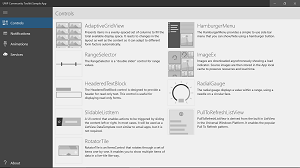News
Microsoft Open Sources Toolkit for UWP Development
- By David Ramel
- August 19, 2016
In its push to spur Windows 10 and Universal Windows Platform (UWP) development, Microsoft has placed a new community toolkit on the GitHub open source code repository.
The UWP, introduced with Windows 10, builds upon the previous Windows Runtime, providing a common app platform for every Windows 10-compatible device, including smartphones.
"Today, we are introducing the open-source UWP Community Toolkit, a new project that enables the developer community to collaborate and contribute new capabilities on top of the SDK," the company said in a Windows Developer blog post Wednesday.
As the community collaborates on the project and adds new features, they will be merged into the Windows SDK for Windows 10 and marked as deprecated in the toolkit. Features of the toolkit will be supported for two release cycles of the Windows SDK for Windows 10, the GitHub site says, or until they're superseded by other principles.
As for features already available, they include: animation such as blur, offset, fade, rotate and scale; controls such as AdaptiveGridView, HamburgerMenu, PullToRefreshListView and many more; code helpers for colors, connections, converters, streams and several more; services such as the Bing search engine, Facebook and Twitter; and tiles and toast notifications.
"The toolkit includes new capabilities (helper functions, custom controls and app services) that simplify or demonstrate common developer tasks," Microsoft said. "Where possible, our goal is to allow app developers to get started with just one line of code."
To make it easier for developers to preview all of the kit's capabilities, Microsoft also released the UWP Community Toolkit Sample App in the Windows Store. It provides sample code that can be copied and pasted into existing projects, which must be UWP applications written in C# or VB.NET.
 [Click on image for larger view.]
The UWP Community Toolkit Sample App (source: Microsoft)
[Click on image for larger view.]
The UWP Community Toolkit Sample App (source: Microsoft)
In the new Windows 10/UWP world order, developers don't write for specific individual OSes, such as Windows Phone and Windows Desktop, but instead target "device families." One benefit of the new UWP system, Microsoft hopes, will be to bolster developer mindshare for its flagging mobile platform.
"Windows 8.1 and Windows Phone 8.1 apps target an operating system (OS): either Windows, or Windows Phone," the company says in its UWP guide. "With Windows 10 you no longer target an operating system but you instead target your app to one or more device families. A device family identifies the APIs, system characteristics, and behaviors that you can expect across devices within the device family. It also determines the set of devices on which your app can be installed from the Store."
The toolkit is designed to help coders adjust to the new development paradigm.
"The toolkit can be used to build UWP apps for any Windows 10 device, including PC, Mobile, XBOX, IoT and HoloLens," Microsoft said in this week's blog post. "You can also use the toolkit with an existing desktop app converted to UWP using the Desktop Bridge."
To use the kit, developers need to download Visual Studio 2015 with Update 3 and the Windows 10 SDK. Visual Studio 2015 comes in a free community edition.
Future updates are planned to be released through the Visual Studio NuGet package manager. To see what those updates might entail, Microsoft is pointing developers to a toolkit roadmap, which lists open issues for milestone v1.1.
Microsoft thanked by name 11 community developers who submitted contributions for the first release of the toolkit and said it was looking forward to more community participation.
"So please go browse the sample app and learn about the experiences, then grab the NuGet package yourself and play around," Microsoft said. "We want developers to give us feedback on the usability and helpfulness of the features that exist in the toolkit. There is much to do in an open source project: we can get some help to improve accessibility and localization, and ensure the current capabilities work for all apps."
More on UWP Development:
About the Author
David Ramel is an editor and writer at Converge 360.